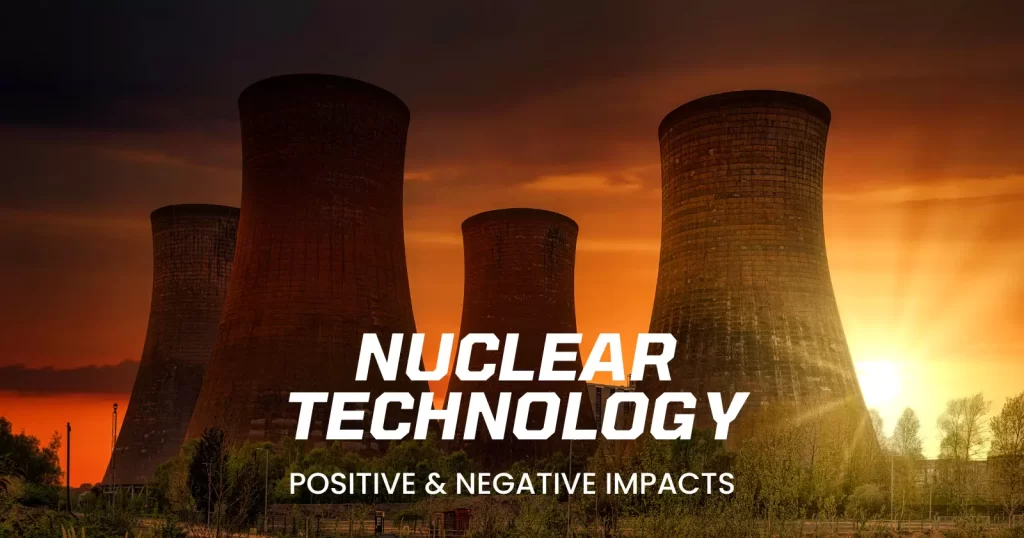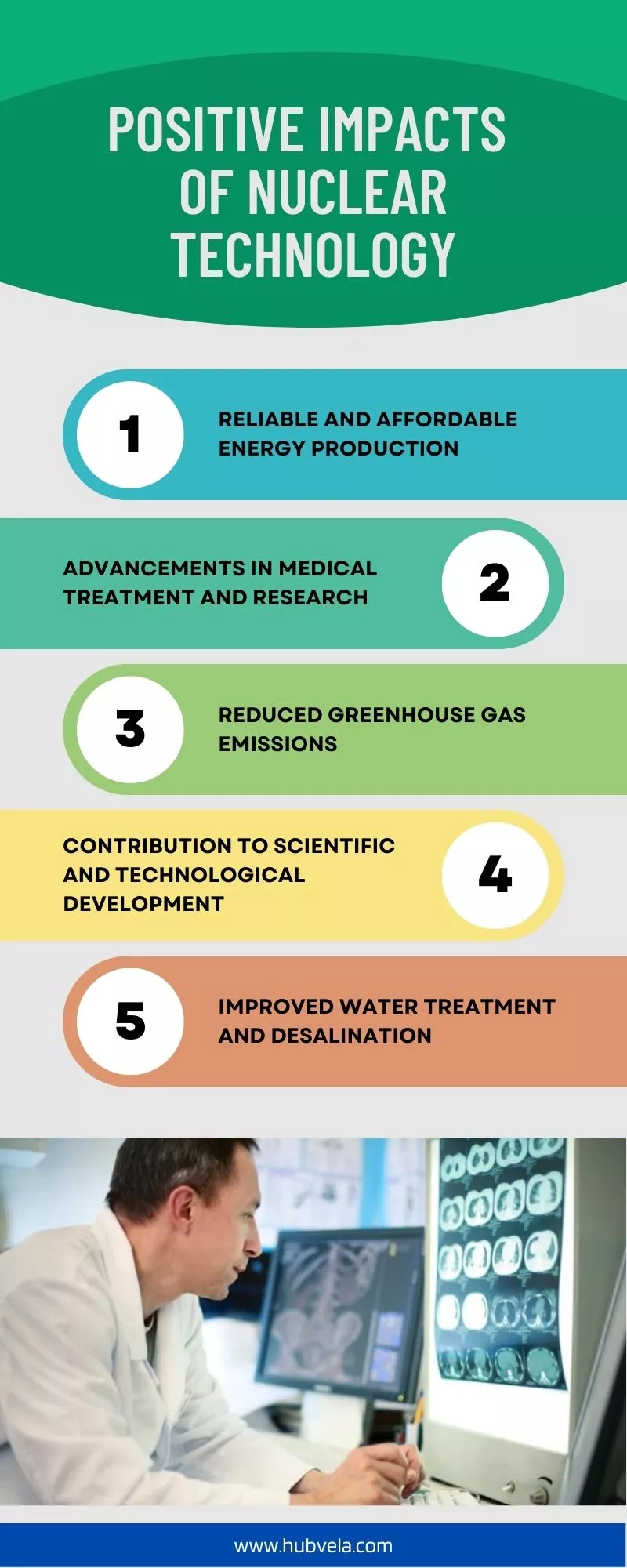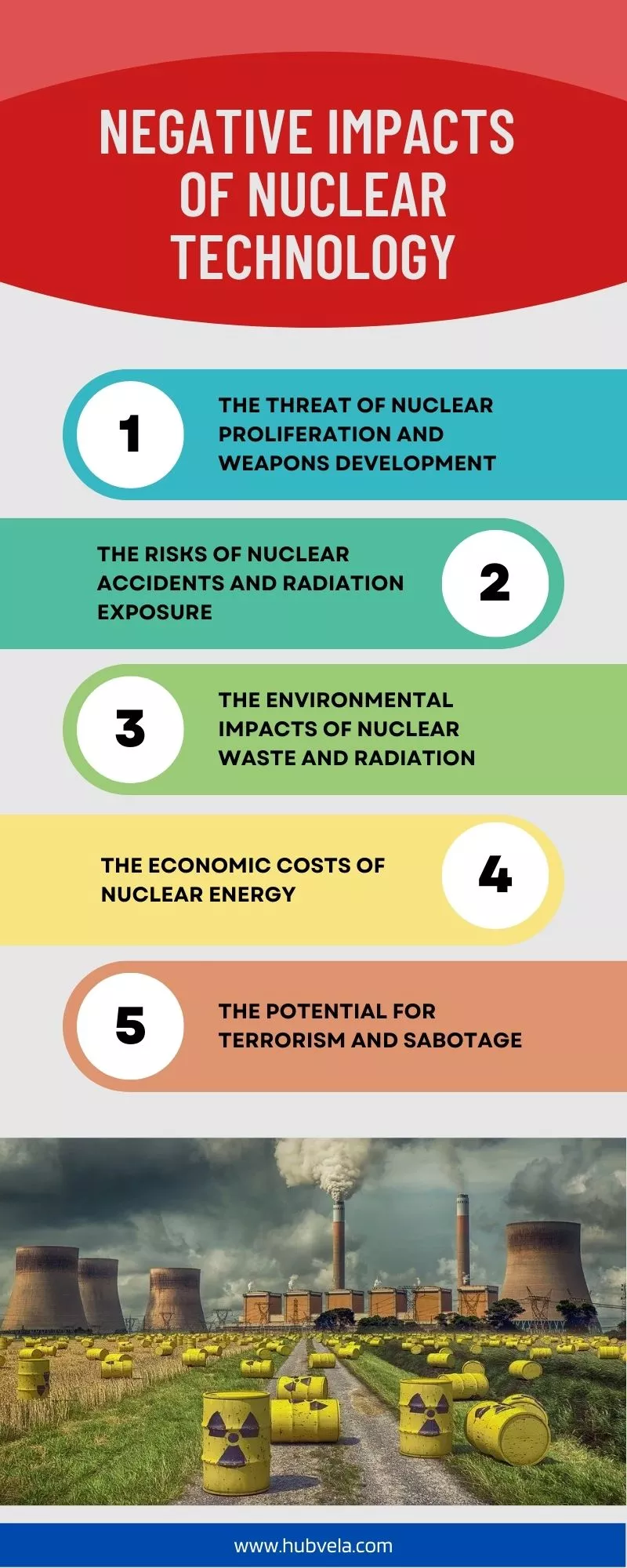Nuclear technology has been a topic of debate for decades, with both positive and negative impacts associated with its use.
On the one hand, nuclear energy is a clean and efficient source of power that can help reduce greenhouse gas emissions.
On the other hand, nuclear accidents can have catastrophic consequences for human health and the environment.
In this article, we will explore both the positive and negative impacts of nuclear technology to gain a better understanding of this complex issue.

--Advertisement--
Positive Impacts of Nuclear Technology
Nuclear technology has been a topic of debate for many years, with concerns about safety and environmental impact.
However, there are also many positive impacts of nuclear technology that should not be overlooked.
Nuclear energy is a reliable source of carbon-free electricity that powers communities in many U.S. states. It also has non-electric applications, such as in the medical field and space exploration.
Additionally, nuclear science and technology have been used to save lives through advancements in nuclear medicine education and training.
We will explore a few major positive impacts of nuclear technology.

1. Reliable and Affordable Energy Production
Nuclear energy is a clean source of power that generates nearly 800 billion kilowatt hours of electricity each year in the United States alone, producing more than half of the nation’s emissions-free electricity.
The use of nuclear energy can help to reduce reliance on fossil fuels, which can have negative environmental impacts.
Additionally, increasing access to clean energy research and technology is one of the targets set by the United Nations for 2030, and nuclear technology can play a role in achieving this goal.
However, it is important to note that there are also challenges associated with nuclear energy, such as safety concerns and waste management.
2. Advancements in Medical Treatment and Research
While nuclear technology is not directly related to advancements in medical treatment and research, there have been many positive impacts of technology on healthcare.
For example, RNA technology has enabled the development of mRNA vaccines for various diseases.
Artificial intelligence (AI) is also being used to support medical professionals in clinical settings and ongoing research.
A Pew Research Center survey found that about 73% of US adults believe science has had a positive effect on society.
Additionally, advances like simulations, virtual patients, and e-learning have evolved as pedagogical strategies to facilitate an active, learner-centered teaching approach in medical education.
These are just a few examples of how technology has positively impacted healthcare.
3. Reduced Greenhouse Gas Emissions
Nuclear power plants do not emit carbon dioxide or other greenhouse gases during operation, unlike fossil fuel power plants.
This means that nuclear energy can be used as a low-carbon alternative to traditional energy sources, which can help reduce the number of greenhouse gases released into the atmosphere.
By using nuclear technology to generate electricity, countries can reduce their reliance on fossil fuels and lower their carbon footprint, which is essential for mitigating climate change.
4. Contribution to Scientific and Technological Development
Nuclear technology has made significant contributions to scientific and technological development. It has been used in various fields such as medicine, energy production, and space exploration.
For example, nuclear medicine uses radioactive isotopes to diagnose and treat diseases. Nuclear power plants generate electricity with fewer greenhouse gas emissions than fossil fuel plants.
Additionally, nuclear technology has been used in space exploration to power spacecraft and rovers.
The development of nuclear technology requires significant scientific research and innovation, which has led to advancements in related fields such as materials science and engineering.
However, it is important to consider the ethical implications of nuclear technology and ensure its safe use for the benefit of society.
5. Improved Water Treatment and Desalination
Desalination is an energy-intensive process, but nuclear power can provide a reliable and sustainable source of energy to power the process.
Additionally, the Bureau of Reclamation is providing funding for innovative water treatment technologies that may make previously unusable water available.
Many desalination plants are located in areas with plenty of sunshine where solar power can provide a more sustainable energy solution, and there are also economic opportunities associated with brine, such as commercial salt and metal recovery.
Improved water supply and better management of water resources can contribute greatly to poverty reduction.
6. Increased Access to Electricity in Developing Countries
Access to electricity in developing countries has been increasing over the years. According to the International Energy Agency, almost 1.2 billion people have gained access to electricity in developing Asia since 2000, with 97% of the region having access in 2020 compared with 67% in 2000.
However, there is still a long way to go as around 759 million people still live without electricity globally. Policies and national programs must be enhanced to tackle energy poverty effectively.
The World Bank has helped deploy solar home systems in Bangladesh, providing reliable access to solar-powered electricity for more than 18.5 million people in rural areas.
Negative Impacts of Nuclear Technology
While nuclear energy is considered a clean source of power, it is not without its negative impacts.
The perception of nuclear power as dangerous or unstable is often based on global nuclear accidents and their association with nuclear weapons.
Additionally, malfunctions can be catastrophic, and the upfront costs are very high. Furthermore, radioactive material emitted as a result of nuclear fission can have harmful effects on human health and the environment.
We will explore the negative impacts of nuclear technology in more detail.

1. The Threat of Nuclear Proliferation and Weapons Development
While nuclear technology has many positive applications, such as in medicine and energy production, the threat of nuclear proliferation and weapons development is a serious concern.
The spread of nuclear weapons to additional countries or terrorist organizations could have catastrophic consequences for humanity.
The use and testing of nuclear weapons can cause significant harm to human life and the environment.
It is important to reduce the risk of nuclear weapons being used by implementing measures to prevent their proliferation and address the threats posed by them.
Therefore, it is crucial that nations work together towards disarmament and non-proliferation efforts while also promoting peaceful uses of nuclear technology.
2. The Risks of Nuclear Accidents and Radiation Exposure
There are also risks associated with nuclear accidents and radiation exposure. Accidents at nuclear power plants can release radioactive materials into the environment, which can contaminate people, buildings, food, water, and livestock.
Exposure to ionizing radiation can increase the risk of cancer, especially in children and adolescents.
It is important to ensure that exposure to radiation is minimized in medical procedures and that safety measures are in place to prevent accidents at nuclear facilities.
While the risks associated with nuclear technology cannot be completely eliminated, they can be managed through proper regulation and safety protocols.
3. The Environmental Impacts of Nuclear Waste and Radiation
While nuclear technology has many positive impacts, it also has negative environmental impacts related to the creation and disposal of radioactive waste.
Radioactive wastes such as uranium mill tailings spent reactor fuel, and other radioactive materials can remain dangerous to human health for thousands of years.
Disposing of nuclear waste safely is difficult and uses precious water resources.
However, significant progress has been made in the safe and effective management of radioactive waste globally.
If not properly managed, radioactive waste can be hazardous to human health and the environment.
Therefore, it is important to continue developing safe methods for managing nuclear waste to minimize its negative environmental impact.
4. The Economic Costs of Nuclear Energy
Nuclear energy is a form of clean energy that has many positive impacts, including reducing greenhouse gas emissions and providing a reliable source of electricity.
However, there are also economic costs associated with nuclear energy.
One of the main economic costs is the high upfront capital cost required to build nuclear power plants.
These costs can be in the billions of dollars and can take years to recoup through electricity sales. Additionally, there are ongoing maintenance and operational costs that must be factored in.
Another economic cost is the potential for accidents or disasters at nuclear power plants. While rare, these events can have significant financial consequences, including cleanup costs and compensation for those affected.
Despite these economic costs, many argue that the benefits of nuclear technology outweigh the drawbacks.
Nuclear energy provides a reliable source of electricity that does not emit greenhouse gases, which is important for mitigating climate change.
Additionally, advancements in technology have made nuclear power safer and more efficient than ever before.
Overall, while there are certainly economic costs associated with nuclear energy, it remains an important part of our clean energy mix and has many positive impacts on society as a whole.
5. The Potential for Terrorism and Sabotage
Nuclear technology has the potential to be used for terrorism and sabotage.
The International Atomic Energy Agency (IAEA) has identified four potential nuclear security risks, including the malicious use of radioactive sources, radiological hazards caused by an attack on or sabotage of a facility, theft of a nuclear weapon, and acquisition of nuclear materials for constructing nuclear explosive devices.
RAND Corporation has also studied the possibility that criminals or political extremists might sabotage nuclear facilities, fabricate a nuclear explosive device, or disperse radioactive material.
The Office of Justice Programs warns that the rapid growth of the civilian nuclear industry and increasing traffic in plutonium and radioactive materials increase the likelihood that criminals or terrorists might engage in some type of nuclear action.
Conclusion on the Positive and Negative Impacts of Nuclear Technology
In conclusion, nuclear technology has both positive and negative impacts. On the positive side, it produces massive amounts of carbon-free electricity, powers communities in many states, and contributes to non-electric applications such as medicine and space exploration.
Additionally, nuclear power plants do not emit any particulate or gaseous pollution, making them cleaner than coal or natural gas power plants.
However, there are also several negative impacts of nuclear energy including high upfront costs, non-renewable uranium resources, nuclear waste management issues, and catastrophic malfunctions.
Furthermore, public perception of nuclear energy is often negative due to concerns about safety and trust in government or industry advocates.
Overall, while nuclear technology has its benefits, it is important to carefully consider its drawbacks before implementing it on a large scale.


